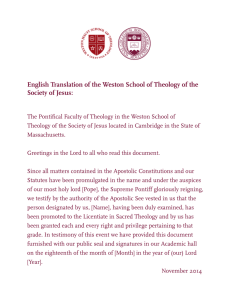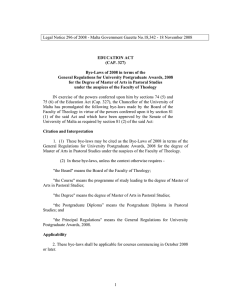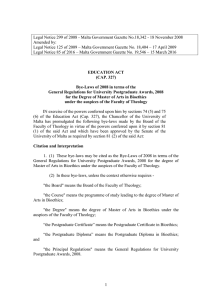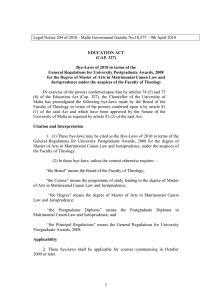Legal Notice 206 of 2010 - Malta Government Gazette No.18,577 –... Amended by:
advertisement
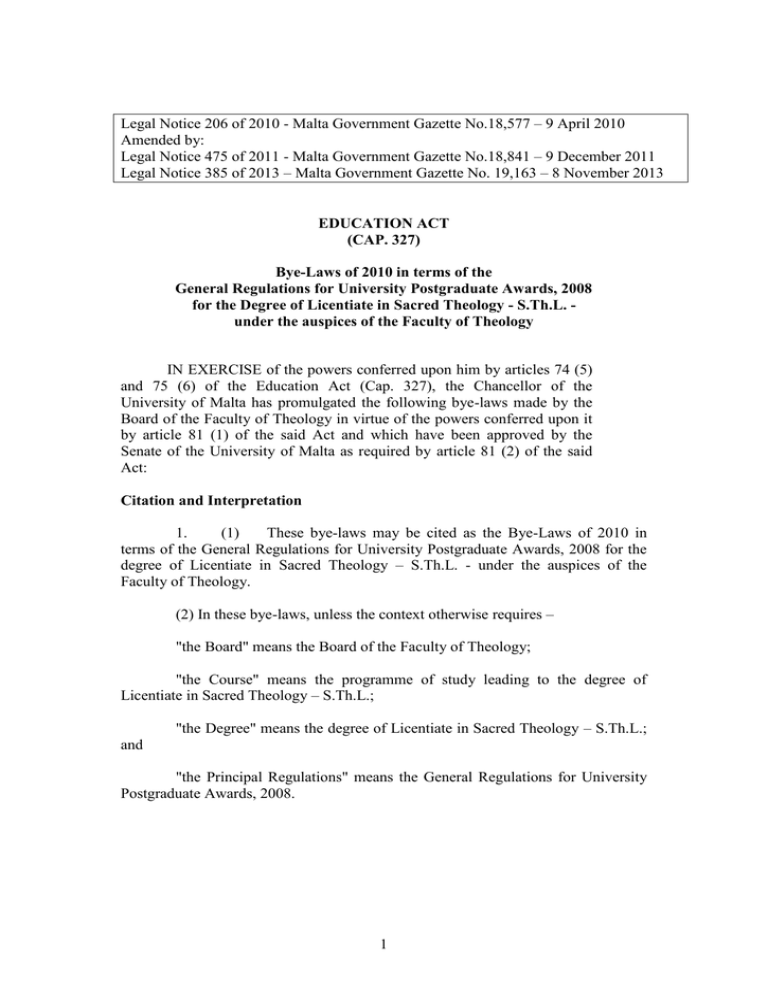
Legal Notice 206 of 2010 - Malta Government Gazette No.18,577 – 9 April 2010 Amended by: Legal Notice 475 of 2011 - Malta Government Gazette No.18,841 – 9 December 2011 Legal Notice 385 of 2013 – Malta Government Gazette No. 19,163 – 8 November 2013 EDUCATION ACT (CAP. 327) Bye-Laws of 2010 in terms of the General Regulations for University Postgraduate Awards, 2008 for the Degree of Licentiate in Sacred Theology - S.Th.L. under the auspices of the Faculty of Theology IN EXERCISE of the powers conferred upon him by articles 74 (5) and 75 (6) of the Education Act (Cap. 327), the Chancellor of the University of Malta has promulgated the following bye-laws made by the Board of the Faculty of Theology in virtue of the powers conferred upon it by article 81 (1) of the said Act and which have been approved by the Senate of the University of Malta as required by article 81 (2) of the said Act: Citation and Interpretation 1. (1) These bye-laws may be cited as the Bye-Laws of 2010 in terms of the General Regulations for University Postgraduate Awards, 2008 for the degree of Licentiate in Sacred Theology – S.Th.L. - under the auspices of the Faculty of Theology. (2) In these bye-laws, unless the context otherwise requires – "the Board" means the Board of the Faculty of Theology; "the Course" means the programme of study leading to the degree of Licentiate in Sacred Theology – S.Th.L.; "the Degree" means the degree of Licentiate in Sacred Theology – S.Th.L.; and "the Principal Regulations" means the General Regulations for University Postgraduate Awards, 2008. 1 For courses commencing October 2013 or later: (2) In these bye-laws, unless the context otherwise requires "the Board" means the Board of the Faculty of Theology; "the Course" means the programme of study leading to the degree of Licentiate in Sacred Theology - S.Th.L.; "the Degree" means the degree of Licentiate in Sacred Theology - S.Th.L.; “the Postgraduate Diploma” means the Postgraduate Diploma in Pastoral Theology; and "the Principal Regulations" means the General Regulations for University Postgraduate Awards, 2008.” Applicability 2. These bye-laws shall be applicable for courses commencing in October 2009 or later. Requirements for Admission 3. (1) The Course shall be open to applicants in possession of: (a) a Bachelor’s degree in Sacred Theology (S.Th.B.) or equivalent obtained with at least Cum Laude, or (b) a qualification considered by Senate, on the recommendation of the Board, as being comparable to the qualifications in sub-paragraph (a). (2) Applicants in possession of a Bachelor’s degree in Sacred Theology (S.Th.B) classified as Probatus may also be admitted, provided that they have obtained other qualifications, including relevant experience, following their first cycle degree. Course Duration 4. The Course shall extend over a period of four semesters of full-time study. The Board may allow students to undertake the dissertation on a part-time basis if students present a valid reason for such a request. Programme of Study 2 For courses commencing in October 2013 or later, bye-law 5 shall be renumbered as bye-law 5. (1). 5. (1) The programme of study shall comprise study-units to which a total of 120 credits are assigned, of which 90 credits assigned to taught study-units and 30 credits assigned to the dissertation study-unit. For courses commencing in October 2013 or later: (2) Students who obtain 60 credits assigned to taught study-units with an average mark of at least 50% and do not proceed with the Course or, having proceeded, do not successfully complete the Course, shall be eligible for the award of the Postgraduate Diploma.” 6. The programme of study shall be published after approval by Senate normally not less than eight months prior to the commencement of the Course. Assessment and Progress 7. (1) The assessment of each taught study-unit shall be completed by the end of the semester in which the teaching of the study-unit is held. (2) Students who in any academic year fail in the assessment of not more than 20 credits for taught study-units shall be given the opportunity to re-sit the failed assessments during the September supplementary examination session. (3) Students who fail in more than the number of credits permitted under paragraph (2) of this bye-law, or students who after re-assessment fail to obtain credit for any study-unit, shall be deemed to have failed the Course. Dissertation 8. (1) Students shall be required to submit an individual dissertation of approximately 25,000 words in accordance with the guidelines issued by the Board. (2) Each student shall be assigned a supervisor who shall provide guidance and advice on a regular basis during the period of study. (3) A provisional title of the dissertation and a detailed research proposal shall be submitted to the Board for approval by the beginning of the second semester. 9. (1) Students shall be required to have regular contact with their supervisor. (2) Supervisors shall submit to the Board progress reports for each student under their supervision at the end of each semester of studies. Such reports may 3 include a recommendation to either (a) extend the period of study in order to enable the student to complete the dissertation; or (b) terminate studies prematurely if the supervisor deems this to be proper in the circumstances, provided that: (i) the extension of the study period referred to in (a) shall be in accordance with the provisions of the Principal Regulations; and (ii) the Board may not terminate studies prematurely according to (b) until it has first given the student a chance to be heard. Classification of the Award 10. The Final Weighted Average Mark for the purpose of the classification of the Degree shall be based on the results obtained in all components of the programme of study, all credits being weighted equally. Repeal 11. The Degree of Licentiate in Sacred Theology (S.Th.L.) Course Regulations, published as Legal Notice 196 of 1990, shall be deemed to cease to be in force as from 1 October 2009, provided that students registered for this course before 1 October 2009 shall continue to be governed by the regulations that were in force at the time of their joining the course. 4
